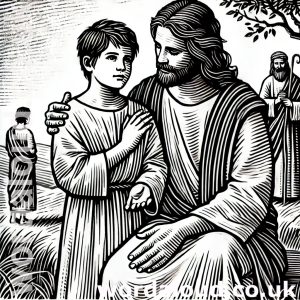Christian Art | Jesus Transfigured | Our Christian Life In Community
Office Of Readings | Week 14, Tuesday, Ordinary Time | A Reading From The Discourses Of Saint Augustine On The Psalms | Psalm 32
‘Those who are outside the fold are our brothers, whether they like it or not.’
‘Whether they like it or not, those who are outside the Church are our brothers’
Saint Augustine appeals for Christian unity with a characteristic blend of pastoral urgency, theological depth, and spiritual realism. Preaching on Psalm 32, Saint Augustine addresses the tensions between the Catholic Church and the schismatic Donatists of his time. Augustine’s central plea is rooted in love: a love not merely for those within the visible bounds of the Church, but also for those who remain separated — those who, despite their divisions, share the same sacraments, pray the same Our Father, and invoke the same Christ.
Historical And Ecclesial Context
Augustine preached this sermon amid the Donatist controversy, a fourth-century schism that arose after the persecution of Christians under Emperor Diocletian. The Donatists insisted on the absolute purity of the Church and rejected the validity of sacraments administered by clergy who had lapsed under persecution. They also practised rebaptism, claiming that those baptised outside their sect lacked the grace of the true Church.
Augustine’s response was both theological and pastoral. He held firmly that the sacraments derive their efficacy not from the holiness of the minister but from Christ himself. Hence, baptism — even when performed outside full ecclesial communion — remains valid. Augustine’s use of Psalm 32 becomes a call not to division, but to reconciliation: ‘Say to them: you are our brothers.’
This is not merely conciliatory language; it reflects his theology of the Church as the Body of Christ. Though divided in discipline or doctrine, those who confess the Credo, invoke Christ, and pray the Our Father are not strangers — they are wounded members of the same Body.
Theological Themes
At the heart of this sermon lies Augustine’s vision of the Church: one, holy, catholic, and apostolic, yet always in need of renewal and reconciliation. His theology resists any temptation to write off those in error or separation. Instead, he insists that shared baptism and the name of the Father establish a real, if imperfect, communion.
This generous Catholic ecclesiology anticipates the later developments of Vatican II, which would affirm that ‘many elements of sanctification and of truth are found outside the visible confines of the Catholic Church’ (Lumen Gentium, 8). Augustine’s concern is deeply pastoral: he knows that division among Christians wounds the Body of Christ and weakens its witness in the world. He urges the faithful not to grow cold or contemptuous toward those separated from the Church, but to love them into unity.
Moreover, Augustine’s argument is sacramental. His emphasis that schismatics ‘celebrate the same sacraments as we, not indeed with us, but still the same’ reflects his belief in the enduring power of grace even when ecclesial bonds are broken. By recognising the baptism of others, Catholics are in fact affirming their fraternity — you are our brothers.
Scriptural Resonance And Spiritual Application
Augustine’s homily is not dry polemic; it is suffused with scriptural depth and spiritual fervour. His use of the Our Father is especially moving: ‘They will only cease to be our brothers when they no longer say: “Our Father.”’ Here, the prayer becomes more than a formula — it becomes the bond of shared sonship and shared hope.
This line anticipates the ecumenical insight that Christians who call on the same Lord cannot be utterly foreign to one another. The implication is that unity is not merely institutional but spiritual. Augustine urges his hearers to avoid a Pharisaic contempt for those in error and to remember that we are all sinners, dependent on grace.
His plea that ‘we should grieve over them as over our brothers’ echoes Christ’s parable of the lost sheep. The faithful are not called to withdraw into superiority but to reach out in tears and prayer. Augustine’s realism — ‘They may say, “Leave us alone,” but we have everything to do with them’ — is rooted in Christ’s unifying love and the indivisible nature of his Body.
Jesus Christ Today
Augustine’s homily remains deeply relevant in our fragmented Christian landscape. His words challenge both triumphalism and indifference. In an age when many Christians are divided by history, doctrine, or misunderstanding, Augustine’s call to charity and recognition of a shared baptism is prophetic.
The Catholic Church today, particularly since the Second Vatican Council, has taken up Augustine’s spirit. In recognising Protestant and Orthodox baptisms, and in entering into sincere ecumenical dialogue, the Church continues to say, ‘You are our brothers.’ This reading challenges us not merely to accept this truth in theory, but to live it: in prayer, dialogue, humility, and shared service of the Gospel.
Augustine’s emphasis on shared sacraments, shared prayer, and shared hope is a model for Christian unity. His insistence that even those outside full communion ‘celebrate the same sacraments… not indeed with us, but still the same,’ provides a basis for mutual respect and a platform for healing.

A Reading From The Discourses Of Saint Augustine On The Psalms | Psalm 32
We entreat you, brothers, as earnestly as we are able, to have charity, not only for one another, but also for those who are outside the Church. Of these some are still pagans, who have not yet made an act of faith in Christ. Others are separated, insofar as they are joined with us in professing faith in Christ, our head, but are yet divided from the unity of his body. My friends, we must grieve over these as over our brothers; and they will only cease to be so when they no longer say our Father.
The prophet refers to some men saying: When they say to you: You are not our brothers, you are to tell them: You are our brothers. Consider whom he intended by these words. Were they the pagans? Hardly; for nowhere either in Scripture or in our traditional manner of speaking do we find them called our brothers. Nor could it refer to the Jews, who do not believe in Christ. Read Saint Paul and you will see that when he speaks of ‘brothers,’ without any qualification, he refers always to Christians. For example, he says: Why do you judge your brother or why do you despise your brother? And again: You perform iniquity and common fraud, and this against your brothers.
Those then who tell us: You are not our brothers, are saying that we are pagans. That is why they want to baptize us again, claiming that we do not have what they can give. Hence their error of denying that we are their brothers. Why then did the prophet tell us: Say to them: You are our brothers? It is because we acknowledge in them that which we do not repeat. By not recognising our baptism, they deny that we are their brothers; on the other hand, when we do not repeat their baptism but acknowledge it to be our own, we are saying to them: You are our brothers.
If they say, ‘Why do you seek us? What do you want of us?’ we should reply: You are our brothers. They may say, ‘Leave us alone. We have nothing to do with you.’ But we have everything to do with you, for we are one in our belief in Christ; and so we should be in one body, under one head.
And so, dear brothers, we entreat you on their behalf, in the name of the very source of our love, by whose milk we are nourished, and whose bread is our strength, in the name of Christ our Lord and his gentle love. For it is time now for us to show them great love and abundant compassion by praying to God for them. May he one day give them a clear mind to repent and to realise that they have nothing now but the sickness of their hatred, and the stronger they think they are, the weaker they become. We entreat you then to pray for them, for they are weak, given to the wisdom of the flesh, to fleshly and carnal things, but yet they are our brothers. They celebrate the same sacraments as we, not indeed with us, but still the same. They respond with the same Amen, not with us, but still the same. And so pour out your hearts for them in prayer to God.
Prayer With Jesus For Christian Unity
Heavenly Father,
you have made us your children through the waters of baptism
and sealed us with the name of your Son.
Though we are divided in many ways,
we are united in calling upon you as “Our Father.”
Grant us the grace to recognise our brothers and sisters in Christ,
even when we are separated by doctrine, history, or misunderstanding.
May our love be patient and constant,
our hearts generous in prayer,
our witness marked by humility and truth.
As Saint Augustine taught,
may we grieve for divisions within the Body of Christ
and labour, not in pride but in love,
for the healing of your Church.
We ask this through Jesus Christ, your Son, our Lord,
who lives and reigns with you in the unity of the Holy Spirit,
God for ever and ever. Amen.
Glossary Of Christian Terms
Donatists – A schismatic group in North Africa who, in the wake of persecution, rejected the validity of sacraments administered by clergy who had lapsed under pressure. Augustine opposed their claim that only the morally pure could validly administer the sacraments.
Ecumenism – The movement towards unity among all Christians. The Second Vatican Council reaffirmed the Catholic Church’s commitment to dialogue and reconciliation with separated Christian communities.
Sacrament – A visible sign of God’s grace. Baptism and the Eucharist are examples. Augustine teaches that sacraments, when validly conferred, remain efficacious even outside full Church communion.
Rebaptism – The practice (rejected by the Catholic Church) of baptizing someone again who has already received valid baptism. Donatists required this of converts from the Catholic Church.
Our Father – The Lord’s Prayer, given by Jesus to his disciples (Matthew 6:9–13). For Augustine, praying this prayer is a powerful sign of Christian unity.
Body of Christ – A scriptural image (see 1 Corinthians 12) for the Church, emphasising both its unity and diversity under the headship of Christ.
Quaternity – Augustine warns against implying a fourth person in the Godhead. Christ is fully God and fully man, but remains one divine person. This term came up in previous readings and applies more broadly to Trinitarian theology.








